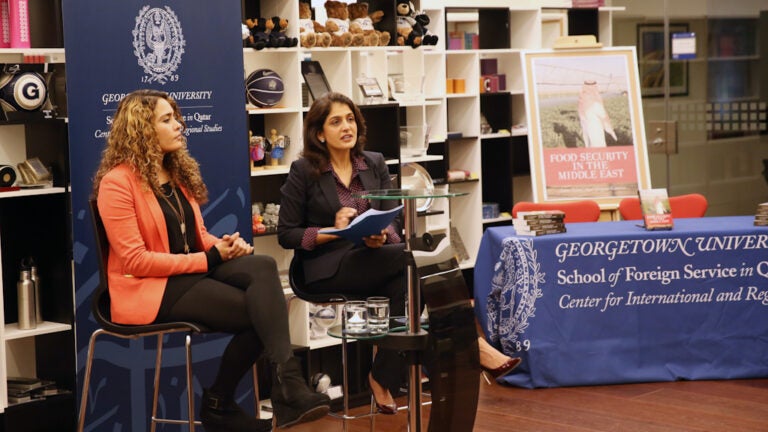Dialogue Series, Race & Society, Regional Studies
CIRS Launches Book on Food Security in the Middle East

On January 19, 2015, CIRS, held a book launch and signing for the recently released volume on Food Security in the Middle East (Oxford University Press, 2014) edited by Zahra Babar, Associate Director for Research at CIRS, and Suzi Mirgani, Manager and Editor for CIRS Publications. The launch was hosted by Shelley Ford, Manager of the Georgetown SFS-Qatar Bookstore.
The book provides empirical case studies of Lebanon, Jordan, Palestine, Egypt, Yemen, the Gulf States and Iran, with special attention to how these countries have been affected by the events of the Arab uprisings and rising food prices following the global economic crisis of 2007-2008. Some of the major themes examined include the ascent and decline of various food regimes, urban agriculture, overseas agricultural land purchases, national food self-sufficiency strategies, distribution networks and food consumption patterns, and nutrition transitions and healthcare. Collectively, the chapters represent highly original contributions to the disciplines of political science, economics, agricultural studies, and healthcare policy, and reflect the increasing urgency of policy and public debate in this subject.
“Everyone agrees that access to food is one of the most basic human rights. But in reality, food has become politicized. What’s more, unlike health care, education, or housing, food has evolved into a security issue,” said book editor and contributing author, Zahra Babar.
She continued, saying: “Unlike certain parts of the developing world, the Middle East is not known as a region that is facing critical famine or starvation. However, it is one of the least self-sufficient regions in the world for obvious reasons, such as water scarcity, but also for some less obvious reasons, such as land reform that impacts sufficiency. In the GCC in particular, huge migration patterns have outpaced food sufficiency and will likely continue to do so, so this is an issue that is far more complex than some might imagine.”
Director of CIRS, Dr. Mehran Kamrava, also contributed to the newly published volume. He said: “We hope this book sets a base of understanding for the full breadth of food security issues, to benefit the work of scholars, researchers, practitioners and policy makers. There hasn’t been an in depth examination of the social and political issues around food sovereignty and the availability and security of food supplies in the Middle East, and this book is an invaluable tool in understanding some of these critically important questions.”
Suzi Mirgani, co-editor of the book, says that the body of work in this volume reflects a new approach to food security. “Current food security issues are shifting from a largely economics-dominated model where the debate centered on macro-level issues of international development to one where sociopolitical factors are becoming increasingly active in how food is conceived, valued, and distributed as a human right, rather than a market force. This book is an attempt to engage with this new paradigmatic shift.”
“This book is a fresh look at the challenges and opportunities associated with food security faced by the Middle East. The thorough treatment of a broad range of topics from trade to self-sufficiency, and from nutrition to the supermarket revolution and emerging dietary habits, make it a truly unique read,” said Dr. Julian A. Lampietti of The World Bank.
The chapters in this volume, published by Oxford University Press and C. Hurst & Co., grew out of a two-year research initiative held under the auspices of CIRS, and includes contributions from 25 leading experts in food security issues from top universities around the world.